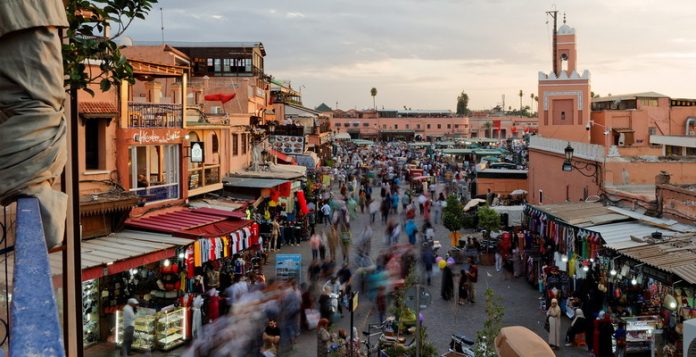International tourism is on track to reach 65% of pre-pandemic levels by the end of 2022 as the sector continues to bounce back from the pandemic.
An estimated 700 million tourists travelled internationally between January and September, more than double (+133%) the number recorded for the same period in 2021. This equates to 63% of 2019 levels and puts the sector on course to reach 65% of its pre-pandemic levels this year, in line with UNWTO scenarios. Results were boosted by strong pent-up demand, improved confidence levels and the lifting of restrictions in an increasing number of destinations.
Highlighting the speed at which the sector has recovered from the worst crisis in its history, the latest World Tourism Barometer from UNWTO reveals that monthly arrivals were 64% below 2019 levels in January 2022 and had reached -27% by September. An estimated 340 million international arrivals were recorded in the third quarter of 2022 alone, almost 50% of the nine-month total.
Europe continues to lead global recovery
Europe continues to lead the rebound of international tourism. The region welcomed 477 million international arrivals in January-September 2022 (68% of the world total), hitting 81% of pre-pandemic levels. This was more than double that of 2021 (+126%) with results boosted by strong intra-regional demand and travel from the United States. Europe saw particularly robust performance in Q3, when arrivals reached almost 90% of 2019 levels.
At the same time, the Middle East saw international arrivals more than triple (+225%) year on year in January-September 2022, climbing to 77% of pre-pandemic levels.. Africa (+166%) and the Americas (+106%) also recorded strong growth compared to 2021, reaching 63% and 66% of 2019 levels, respectively. In Asia and the Pacific (+230%) arrivals more than tripled in the first nine months of 2022, reflecting the opening of many destinations, including Japan at the end of September. However, arrivals in Asia and the Pacific remained 83% below 2019 levels. China, a key source market for the region, remains closed.
Arrivals and receipts at – or above – pre-pandemic levels
Several subregions reached 80% to 90% of their pre-pandemic arrivals in January-September 2022. Western Europe (88%) and Southern Mediterranean Europe (86%) saw the fastest recovery towards 2019 levels. The Caribbean, Central America (both 82%) and Northern Europe (81%) also recorded strong results. Destinations reporting arrivals above pre-pandemic levels in the nine months through September include Albania, Ethiopia, Honduras, Andorra, Puerto Rico, Dominican Republic, Colombia, El Salvador and Iceland.
In the month of September arrivals surpassed pre-pandemic levels in the Middle East (+3% over 2019) and the Caribbean (+1%) and came close in Central America (-7%), Northern Europe (-9%) and Southern and Mediterranean Europe (-10%).
Meanwhile, some destinations recorded notable increases in international tourism receipts in the first seven to nine months of 2022, including Serbia, Romania, Türkiye, Latvia, Portugal, Pakistan, Mexico, Morocco and France. The recovery can also be seen in outbound tourism spending from major source markets, with strong results from France where expenditure reached -8% through September, compared to 2019. Other markets reporting strong spending in the first six to nine months of 2022 were Germany, Belgium, Italy, the United States, Qatar, India and Saudi Arabia.
Strong demand for air travel and hotel accommodation
The robust recovery of tourism is also reflected in various industry indicators such as air capacity and hotel metrics, as recorded in the UNWTO Tourism Recovery Tracker. Air seat capacity on international routes (measured in available seat-kilometres or ASKs) in January-August reached 62% of 2019 levels, with Europe (78%) and the Americas (76%) posting the strongest results. Worldwide domestic capacity rose to 86% of 2019 levels, with the Middle East (99%) virtually achieving pre-pandemic levels (IATA).
Meanwhile, according to STR, global hotel occupancy rates reached 66% in September 2022, from 43% in January. Europe led the way with occupancy levels at 77% in September 2022, following rates of 74% in July and August. The Americas (66%), the Middle East (63%) and Africa (61%) all saw occupancy rates above 60% in September. By subregion, Southern Mediterranean Europe (79%), Western Europe (75%) and Oceania (70%) showed the highest occupancy rates in September 2022.
Cautious optimism for the months ahead
The challenging economic environment, including persistently high inflation and soaring energy prices, aggravated by the Russian offensive in Ukraine, could weigh on the pace of recovery in Q4 and into 2023. The latest survey among the UNWTO Panel of Tourism Experts shows a downgrade in confidence levels for the last four months of 2022, reflecting more cautious optimism. Despite growing challenges pointing to a softening of the recovery pace, export revenues from tourism could reach USD 1.2 to 1.3 trillion in 2022, a 60-70% increase over 2021, or 70-80% of the USD 1.8 trillion recorded in 2019.















